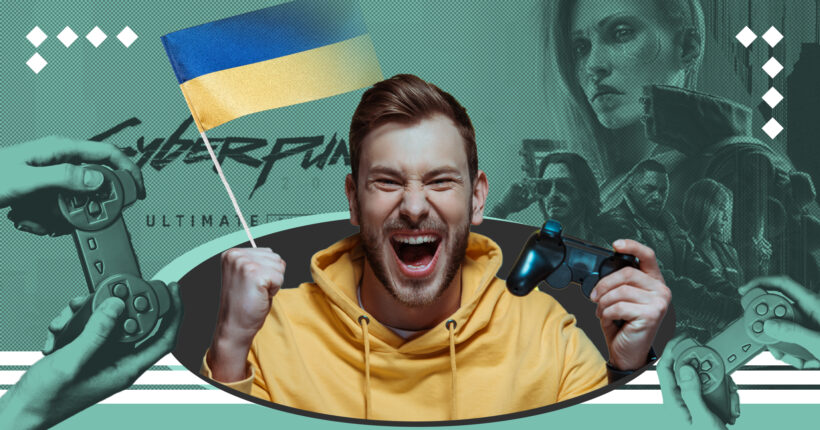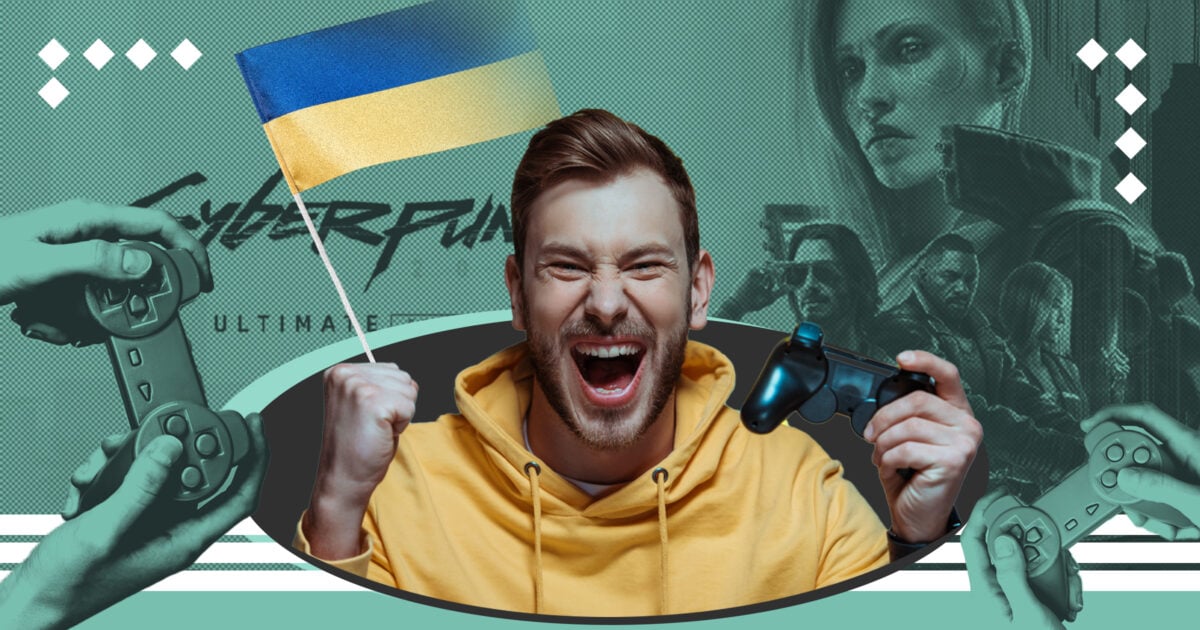
Localization is the process of preparing a video game for a market outside of where it was originally published.
Rubryka spoke with the localization union SBT Localization and YouTuber Yulian Hrycevych about the difficulties of translation, demand among gamers, and changes of the Ukrainian video game community after Russia's full-scale invasion.
What is the problem?
Situation before the full-scale war
Due to the significant influence of Russia, Ukraine was classified as a Commonwealth of Independent States (CIS) region. For a long time, most video games on the market were translated into Russian only. Sometimes, there were Ukrainian localizations, but these were indie games or Ukrainian ones, such as the Metro series, Cossacks, and Stalker. But this is rather an exception than a rule. Most branches of large companies, such as Sony, Ubisoft, Nintendo, etc., opened their offices only in Moscow.
Another reason for the lack of Ukrainian localization in the projects was the small profit from the region because piracy has been widespread in Ukraine since the beginning of the video game industry. For example, according to Go Globe statistics, as of 2020, Ukraine was in sixth place in the anti-rating of visits to pirate sites.

Go Globe infographic.
Sometimes, Ukrainian appeared in projects thanks to fan-made unofficial localizations or thanks to the efforts of localization studios, which agreed with video game companies to make a translation. However, Ukrainian version was usually added later, so Ukrainians had to play in English or Russian immediately at first. Many gamers don't even know their favorite game might have received a Ukrainian localization and keep playing in a foreign language.
What has changed since the start of Russia's full-scale war
First, large companies began to pay attention to Ukrainian gamers and stopped identifying them with Russians — they understood Ukrainians wanted to play in their native language and were willing to buy and support games for that.
"Over the past two years, Ukrainians have started receiving large projects in their native language on the release date. This is a very serious step towards the Ukrainization of gaming universes," the SBT Localization team shares.

During these two years, such AAA projects as "Cyberpunk 2077" and the expansions "Phantom Liberty," "Baldur's Gate III," "Alan Wake 2", and "Subnautica: Below Zero" were translated into Ukrainian. These are projects with a huge amount of text, and the fact that it is now possible to play them in Ukrainian is a big step forward. "Baldur's Gate III" alone has over 2,000,000 words. Players are interested not only in the localization itself but also in the process of its creation and the people behind it.
Of course, even after the full-scale invasion of Russia, some players are still comfortable playing in Russian, but the demand for Ukrainian is growing.
"I personally know of cases when people refused Ukrainian localization in favor of Russian only because the Russian version had full dubbing, and they would have to read subtitles in Ukrainian," says Yulian Hrytsevych, a video game blogger. "However, after the start of the full-scale invasion, the percentage of players using the Ukrainian localization is increasing, and this is an excellent trend. I believe this demand will create an ever-increasing supply over time."
Scandals related to localization
The game industry could not do without scandals. The biggest and loudest of them is the "Cyberpunk 2077" localization. Ukrainian was added to this game along with the expansion "Phantom Liberty." The Russians were shocked by the absence of the Russian version of the expansion. Therefore, they began to look for flaws in the Ukrainian translation.
Russian gamers seem to have managed to find Russophobia there, so they started spreading their discontent on the network and writing to the developers en masse. The latter publicly apologized and promised to correct these shortcomings. In fact, localizers only changed a few moments in the game. It is important to note that in the original "Cyberpunk 2077," there are many moments in which the Soviet Union and Russians are mentioned with harsh satire.

For example, the phrase "Couldn't all these Russians have died somewhere in Pustka?" is said by one of the police officers at the crimescene. In the original version, instead of "Russians," the word "assholes" is used. But even here, the context was about the criminals from the Scavengers gang, most of whom are of the USSR origin.
"However, I understand why someone did not like such an adaptation — many see it as the addition of real events from the Russian-Ukrainian war into the game world," notes Hrytsevych.
Ukrainian localizers corrected inaccuracies in the translation, but only where they did not correspond to the original. The phrase "f*cking russkies" was not changed and is translated into Ukrainian in a similar style.
(Non) Ukrainian translators
The second problem is more extensive — games are still translated into Ukrainian by Russians. It is cheaper and easier for video game studios to order a package of translations instead of negotiating with all of them individually.
The number of studios involved in translating games is not that great. The largest studios either do not have Ukrainian translators on staff or have not yet recruited them. There are also few Ukrainian game translation studios. At the same time, one should not forget that there is an element of price — it is always easier to choose a studio that will produce a more comprehensive package of languages for a certain amount than to look for individual translators for each language. So far, among the big studios, only Ukraine's neighbors have paid attention to translating games into Ukrainian.
For example, for "Alan Wake 2," the localization package was bought from "Keywords Localization," an Irish localization service from Keywords Studios that translates games and software into more than 50 languages. However, the contractor hired freelancers, among whom were Russians. Therefore, there are many funny inaccuracies in the game.

Ukrainian localizations created by Russians, a priori, cannot be of high quality since they are not native speakers of the language. Yes, they can use various AIs for translation and easily edit them as they see fit, but machine translations are not perfect. As a result, instead of high-quality localization, the gamers receive language inaccuracies and word mixups.
In such situations, it is essential to take the issue to social networks, contact the developers, ask them to fix the mistakes, and not hire Russians to translate into Ukrainian anymore. There was also a similar scandal with "Ghostrunner 2", where there were many problems due to machine translation handled by non-native speakers.
What is the solution?
How to support Ukrainian in games
To begin with, buy games, don't pirate. This way, the developer sees that the money spent on localization is not in vain. Piracy, on the contrary, is harmful because even if you play in Ukrainian, the developer does not see it.
Most digital game stores like Steam or Epic Games Store have wishlists. You simply mark the game as the one you want to buy on release so the developer can find out about the interest in their project in a certain region and think about localization. Changing the interface language to Ukrainian in such stores is also important. These are simple actions, but they help to develop Ukrainian.
"Games are a business. Accordingly, the implementation of Ukrainian localization is a risky business decision, which must be justified by numbers," says Hrytsevich. These figures are taken from statistics provided to developers and publishers by digital distribution services such as Steam. In addition, the developers can conduct market research to try to estimate the number of players interested in this genre and then estimate how many of them would buy the game with and without localization.
It is possible to additionally push video game companies to introduce Ukrainian — for example, create discussions on forums and topics in Steam and post on social networks. However, writing about the desire to play in your own language without the aggression or bullying of certain companies is essential.
"To popularize Ukrainian language in games, it is necessary to stop pirating games, not to play in Russian, to actively request Ukrainian from the developers and to play in Ukrainian in those projects where it is already available," concluded Hrytsevych.
A good example
A successful example of the development of the localization market is Poland. Ukraine has almost the same population, but the number of games in Polish is twice as large. The GameSensor platform provided statistics on paid games on Steam with Ukrainian localization.

"GameSensor" infographic.

"GameSensor" infographic. The existence of Ukrainian localization in games on Steam.
As we can see, the number of translations increased, but the percentage of translations became lower. On the other hand, the results for Ukraine's neighbors are better, although they are still not perfect.

"GameSensor" infographic.
However, the percentage of translations reaches almost 6% compared to 3% in Ukraine.

"GameSensor" infographic.
The Polish interface in Steam is used by almost 2% of players, while the Ukrainian interface is used by only 0.50%. This is already better than before the full-scale invasion when the percentage was about 0.16.
Therefore, it is essential to buy Ukrainian, play it, and support it. Video games are one of the levers of influence in the international market. They can be used as soft power to convey the necessary messages and lobby for pro-Ukrainian interests. It is important to explain to foreign companies that Ukraine and Russia are different countries, and Ukrainians want to play in their own language.
Newsletter
Digest of the most interesting news: just about the main thing






